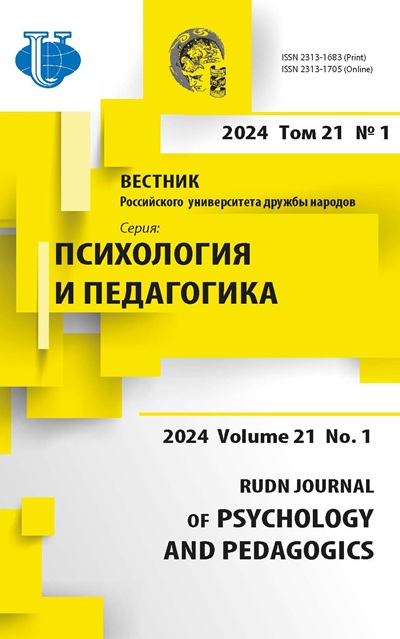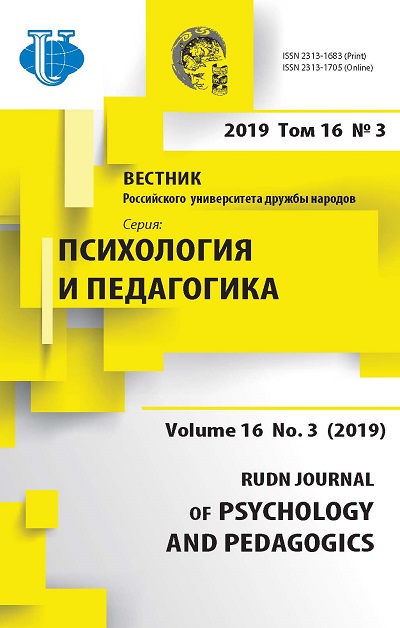Development of Approach to Typology of Internet Communities based on Discursive Markers of Collective Subjectivity
- Authors: Pavlova N.D1, Voronin A.N1, Grebenschikova T.A1, Kubrak T.A1
-
Affiliations:
- Institute of Psychology, Russian Academy of Sciences
- Issue: Vol 16, No 3 (2019)
- Pages: 341-358
- Section: SOCIAL AND PERSONALITY PSYCHOLOGY
- URL: https://journals.rudn.ru/psychology-pedagogics/article/view/22134
- DOI: https://doi.org/10.22363/2313-1683-2019-16-3-341-358
Cite item
Full Text
Abstract
The article discusses the problems of the typology of network communities, representing the new social reality of modern digital society. The methodology of a comprehensive study of social communities based on socio-psychological and psycholinguistic methods, the use of the discursive approach and the subject category, little studied in relation to large social groups, determine the novelty of the research. According to the main research hypothesis, various forms of group subjectivity, which determine its readiness for joint activities, are manifested in the discourse of the network community, which constitutes it by mediating the interaction of its members, transmitting ideas about the world, values, relations, attitudes and setting patterns of behavior. We defined discursive features of internet communities relevant to the various forms of group subjectivity and subjectivity criteria - interconnectedness, focus on joint activities, etc. A procedure for identifying discursive characteristics of the subjectivity of a network community of various levels (lexical, procedural, semantic) was presented and their examples were given. On this basis, a comparative analysis of network communities, providing for the future creation of their psychological typology was carried out.
About the authors
Natalya D Pavlova
Institute of Psychology, Russian Academy of Sciences
Author for correspondence.
Email: pavlova_natalya@mail.ru
Doctor Sc. of Psychology, is Head of the Laboratory of Psychology of Speech and Psycholinguistics
13 Yaroslavskaya St., Moscow, 129366, Russian FederationAnatoly N Voronin
Institute of Psychology, Russian Academy of Sciences
Email: voroninan@bk.ru
Doctor Sc. of Psychology, Full Professor, is Chief Researcher of the Laboratory of Psychology of Speech and Psycholinguistics
13 Yaroslavskaya St., Moscow, 129366, Russian FederationTaisiya A Grebenschikova
Institute of Psychology, Russian Academy of Sciences
Email: gretiya@mail.ru
Ph.D. in Psychology, is Senior Researcher of the Laboratory of Psychology of Speech and Psycholinguistics
13 Yaroslavskaya St., Moscow, 129366, Russian FederationTina A Kubrak
Institute of Psychology, Russian Academy of Sciences
Email: kubrak.tina@gmail.com
Ph.D. in Psychology, is Senior Researcher of the Laboratory of Psychology of Speech and Psycholinguistics
13 Yaroslavskaya St., Moscow, 129366, Russian FederationReferences
- Bondarenko, S.V. (2004). Sotsial’naya struktura virtual’nykh setevykh soobshchestv. Rostovna-Donu, Rostov State University. (In Russ.)
- Cheung, M.K., & Thadani, D.R. (2012). The Impact of Electronic Word-of-Mouth Communication: A Literature Analysis and Integrative Model. Decision Support Systems, 54(1), 461–470. https://doi.org/10.1016/j.dss.2012.06.008
- Emelyanova, T.P., & Zhuravlev, A.L. (2009). Psihologiya bol’shih social’nyh grupp kak kollektivnyh sub”ektov. Psihologicheskij zhurnal, 30(3), 5–15. (In Russ.)
- French, M., & Bazarova, N.N. (2017). Is Anybody Out There?: Understanding Masspersonal Communication Through Expectations for Response Across Social Media Platforms. Journal of Computer-Mediated Communication, 22(6), 303–319. https://doi.org/10.1111/jcc4.12197
- Galuba, W., Aberer, K., Chakraborty, D., Despotovic, Z., & Kellerer, K. (2010). Outtweeting the Twitterers: Predicting Information Cascades in Microblogs. OnLine Social Networks: Proceeding of the 3rd International Conference (p. 33). USENIX Association. Retrieved from https://www.usenix.org/legacy/event/wosn10/tech/full_papers/Galuba.pdf
- Glaser, B. (1978). Theoretical Sensitivity. Mill Valley, CA: Sociology Press. Goroshko, E.I., & Polyakova, T.L. (2015). K postroeniyu tipologii zhanrov sotsial’nykh media. Zhanry Rechi, (2), 119–127. (In Russ.)
- Gradoselskaya, G.V., & Pilgun, M.A. (2015). Communicative Processes in the Network Environment: the Interdisciplinary Analysis of Politically Active Communities on Facebook. Journal of Psycholinguistics, (4), 44–58. (In Russ.)
- Grebenshchikova, T.A., Kubrak, T.A., Voronin, A.N., & Pavlova, N.D. (2018). Postroenie strukturno-funktsional’noi modeli transformatsii predstavlenii o sotsial’no-znachimom sobytii v khode setevoi aktivnosti pol’zovatelei. Proceedings of Vos’maya Mezhdunarodnaya konferentsiya po kognitivnoi nauke (pp. 304–306). Svetlogorsk. (In Russ.)
- Hammond, M. (2017). What is an online community? A new definition based around commitment, connection, reciprocity, interaction, agency, and consequences. International Journal of Web Based Communities, 13(1), 118–136.
- Heirman, W., Angelopoulos, S., Wegge, D., Vandebosch, H., Eggermont, S., & Walrave, M. (2015). Cyberbullying-Entrenched or Cyberbully-Free Classrooms? A Class Network and Class Composition Approach. Journal of Computer-Mediated Communication, 20(3), 260–277. https://doi.org/10.1111/jcc4.12111
- Kamensky, Е.G., & Grimov, O.A. (2014). Online communities at social networking services as factor of personal subjectness development. Vestnik of Lobachevsky State University of Nizhni Novgorod, 2(34), 62–67. (In Russ.)
- Kirilina, A.V. (2015). The Internet Genre of “Reader Comments”. Vestnik Moscow City Teacher Training University, (1), 67–76. (In Russ.)
- Kirillov, A.G. (2017). Transformatsiya zhanra bloga v programmakh obmena mgnovennymi soobshcheniyami. Zhanry Rechi, (2), 260–267. (In Russ.)
- Konchakovskij, R.V. (2010). Setevoe internet-soobshchestvo kak sociokul’turnyj fenomen. Ph.D. in Sociology Thesis. Ekaterinburg: The Ural State University. (In Russ.)
- Kuryanovich, A.V. (2018). Experience of linguistic and legal personality characteristics of conflict language personality (on the example of analysis of communicative behavior of troll in the network correspondence). Tomsk State Pedagogical University Bulletin, (2), 127–142. https://doi.org/10 .23951/1609-624X-2018-2-127-142. (In Russ.)
- Patarakin, E.D. (2017). Makroskopicheskii podkhod k analizu sovmestnoi setevoi deyatel’nosti. Obrazovatel’nye Tekhnologii, (2), 51–65. (In Russ.)
- Pavlova, N.D., Grebenshchikova, T.A., Voronin, A.N., Zachesova, I.A., & Kubrak, T.A. (2018). Postsobytiinyi diskurs v Internete. In V.V. Znakov & A.L. Zhuravlev (Eds.), Psikhologiya Cheloveka kak Sub”Ekta Poznaniya, Obshcheniya i Deyatel’nosti (pp. 1845–1851). Moscow: Institut psikhologii RAN Publ. (In Russ.)
- Pavlova, N.D., & Grebenshchikova, T.A. (2017). Intent-analiz. Osnovaniya, protsedura, opyt ispol’zovaniya. Moscow: Institut psikhologii RAN Publ. (In Russ.)
- Pavlova, N.D., Voronin, A.N., Grebenshchikova, T.A., Kubrak, T.A. et al. (2011). Diskurs v Sovremennom Mire. Psikhologicheskie Issledovaniya. Moscow: Institut psihologii RAN Publ. (In Russ.)
- Radina, N.K. (2016). Intention Analysis of Online Discussions (based on the example of comments on the materials of the Internet portal “InoSMI.ru”). Mediaskop 4. Retrieved from http://www.mediascope.ru/2238. (In Russ.)
- Sergeeva, A.S., Kirillov, B.A., & Voronina, E.Yu. (2016). Kommentarii kak forma diskursa professional’nogo virtual’nogo soobshchestva (na primere IT). In A.L. Zhuravlev, N.D. Pavlova & I.A. Zachesova (Eds.), Psikhologiya Diskursa: Problemy Determinatsii, Vozdeistviya, Bezopasnosti (pp. 84–101). Moscow: Institut psihologii RAN Publ. (In Russ.)
- Sidorova, I.G. (2011) Pragmatic communication characteristics of personal and interpersonal genres in the internet discourse. Science Journal of Volgograd State University. Linguistics, 2(14), 154–159. (In Russ.)
- Vezhnovets, E. (2016). Kommentarii v sotsial’nykh setyakh: proizvodstvo i vosproizvodstvo internet-diskursa. Sovremennyi diskurs-analiz, (2), 35–58. (In Russ.)
- Vicario, M., Bessi, A., Zollo, F., Petroni, F., Scala, A., Stanley, H.E., & Quattrociocchi, W. (2015). Echo chambers in the age of misinformation. Retrieved from https://arxiv.org/abs/1509.00189
- Vorontsova, T.A. (2016). Trolling i fleiming: rechevaya agressiya v internet-kommunikatsii. Vestnik Udmurtskogo universiteta. Seriya: Istoriya i filologiya, 26(2), 109–116. (In Russ.)
- Vyshegorodtsev, D.E. (2002). Osobennosti Setevykh Soobshchestv Interneta: Russkoyazychnyi Segment. Ph.D. in Sociology. Moscow: Moscow Humanitarian and Social Academy. (In Russ.)
- Yardi, S., & Boyd, D. (2010). Dynamic Debates: An Analysis of Group Polarization Over Time on Twitter. Bulletin of Science. Technology & Society, 30(5), 316–327. https://doi.org/10.1177/0270467610380011
- Zhang, X., Han, D.-D., Yang, R., Zhang, Z. (2017). Users’ participation and social influence during information spreading on Twitter. PLOS ONE, 12(9), e0183290. http://doi.org/10.1371/journal.pone.0183290
- Zhuravlev, A.L. (2018). Kollektivnyi sub”ekt kak fenomen i ponyatie v sovremennoi psikhologii. In A.L. Zhuravlev & Е.A. Sergienko (Eds.), Razrabotka Ponyatii Sovremennoi Psikhologii (pp. 116–161). Moscow: Institut psihologii RAN Publ. (In Russ.)
- Zhuravlev, A.L., & Nestik, T.A. (2010). Psihologiya Upravleniya Sovmestnoj Deyatel’nost’yu. Novye Napravleniya Issledovanij. Moscow: Institut psihologii RAN Publ. (In Russ.)
















